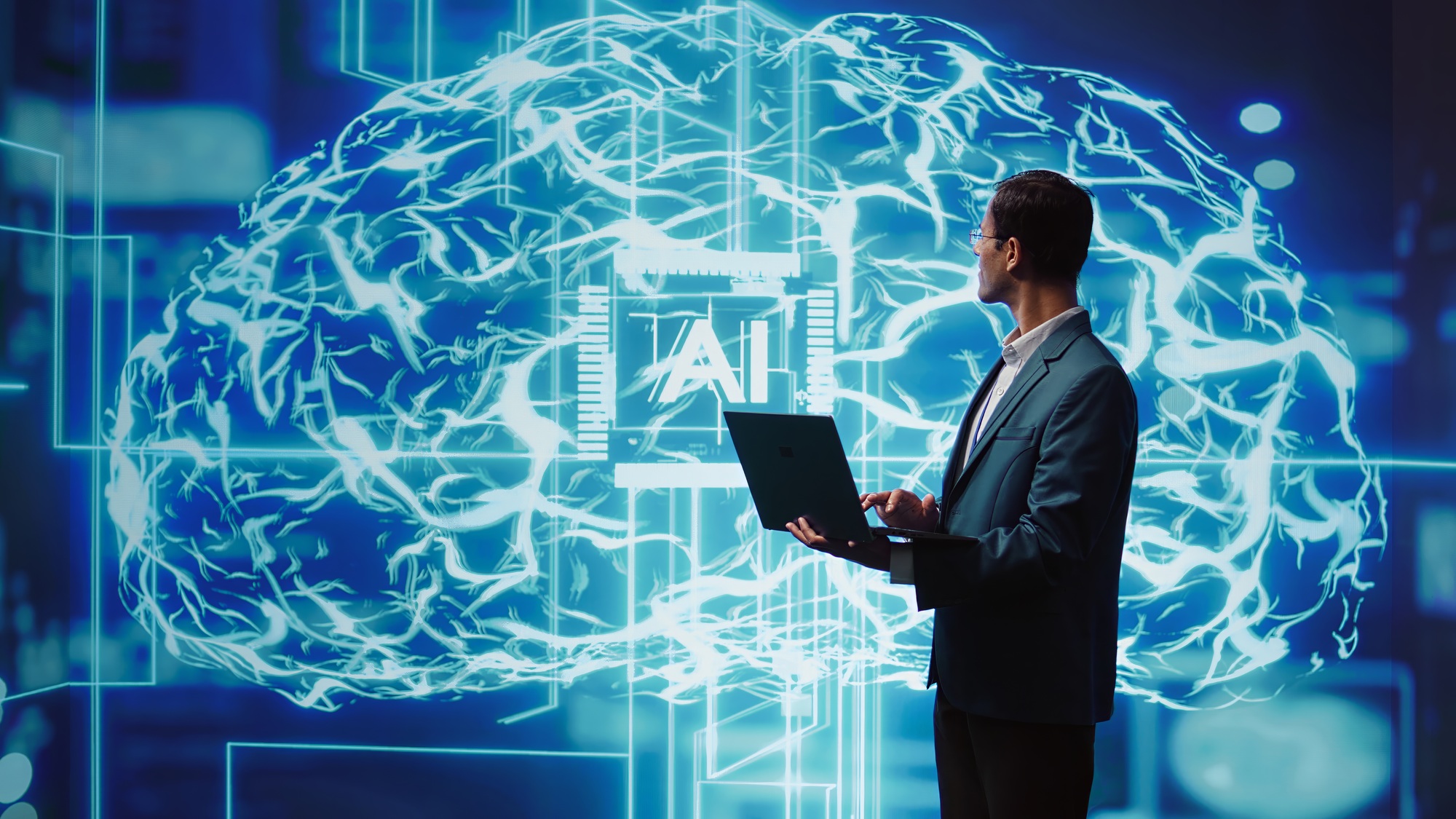AI Background for Presentation – Demystifying AI
Table of Contents
Artificial Intelligence (AI) has become a buzzword in recent years, but many people still struggle to understand what it really means. In simple terms, AI refers to the ability of machines to perform tasks that typically require human intelligence. This can include anything from understanding natural language and recognizing patterns to making decisions and solving problems.
The concept of AI has been around for decades, but recent advancements in technology have brought it to the forefront of innovation and development. As a result, AI has the potential to revolutionize industries and change the way we live and work.
Key Takeaways
- AI is a rapidly evolving field that has the potential to revolutionize various industries and aspects of our daily lives.
- Understanding the basics of AI, including its evolution, key concepts, and terminology, is essential for grasping its potential and limitations.
- Machine learning plays a crucial role in AI, enabling systems to learn from data and improve their performance over time.
- Common misconceptions about AI, such as its ability to think and feel like humans, need to be addressed to foster a more realistic understanding of its capabilities.
- Ethical considerations in AI development and implementation, as well as the future opportunities and challenges it presents, are important factors to consider in the ongoing advancement of this technology.
Understanding the Basics of Artificial Intelligence

At its core, AI is about creating intelligent machines that can mimic human cognitive functions. This can be achieved through various techniques, including machine learning, natural language processing, and computer vision. Machine learning, in particular, is a key component of AI, as it allows machines to learn from data and improve their performance over time.
This is done through the use of algorithms that analyze and interpret large amounts of data to identify patterns and make predictions. Natural language processing, on the other hand, enables machines to understand and respond to human language, while computer vision allows them to interpret and analyze visual information. By combining these techniques, AI systems can perform a wide range of tasks, from recognizing speech and images to making decisions and solving complex problems.
The Evolution of AI: From Concept to Reality
The concept of AI dates back to ancient times, with myths and legends often featuring intelligent machines and automatons. However, it wasn’t until the 20th century that AI began to take shape as a scientific discipline. The term “artificial intelligence” was first coined in 1956 at a conference at Dartmouth College, where researchers discussed the possibility of creating machines that could think and learn like humans.
Since then, AI has gone through several periods of growth and development, with significant advancements in areas such as machine learning, neural networks, and deep learning. Today, AI is no longer just a concept; it is a reality that is being integrated into various industries and applications, from healthcare and finance to transportation and entertainment.
Key Concepts and Terminology in AI
| AI Background for Presentation – Demystifying AI | |
|---|---|
| AI Definition | Artificial Intelligence is the simulation of human intelligence processes by machines, especially computer systems. |
| AI Applications | AI is used in various fields such as healthcare, finance, transportation, customer service, and more. |
| AI Benefits | Improved efficiency, better decision making, automation of repetitive tasks, and enhanced customer experiences. |
| AI Challenges | Ethical concerns, job displacement, data privacy, and potential biases in AI algorithms. |
| AI Future | Continued advancements in AI technology, integration into more industries, and potential societal impacts. |
In order to understand AI, it’s important to be familiar with some key concepts and terminology. One of the most fundamental concepts in AI is the idea of “intelligence,” which refers to the ability to acquire knowledge and apply it to solve problems. This can be achieved through various means, such as reasoning, learning, and perception.
Another important concept is “machine learning,” which involves training machines to learn from data and make predictions or decisions based on that data. This is typically done through the use of algorithms that analyze patterns in the data and adjust their behavior accordingly. Other important terms in AI include “neural networks,” which are systems inspired by the structure of the human brain, and “deep learning,” which involves training neural networks with large amounts of data to achieve high levels of performance.
The Role of Machine Learning in AI
Machine learning plays a crucial role in AI, as it enables machines to learn from data and improve their performance over time. This is done through the use of algorithms that analyze and interpret large amounts of data to identify patterns and make predictions. There are several different types of machine learning, including supervised learning, unsupervised learning, and reinforcement learning.
In supervised learning, machines are trained on labeled data, which allows them to make predictions or decisions based on that data. Unsupervised learning, on the other hand, involves training machines on unlabeled data, which allows them to identify patterns and relationships within the data. Reinforcement learning is a type of machine learning where machines learn by interacting with an environment and receiving feedback on their actions.
Common Misconceptions about Artificial Intelligence
There are many misconceptions about AI that can lead to misunderstandings and confusion. One common misconception is that AI is only about creating human-like robots or androids. While this is certainly one aspect of AI, it is not the only one.
In reality, AI encompasses a wide range of technologies and applications, from virtual assistants and chatbots to recommendation systems and autonomous vehicles. Another common misconception is that AI will replace human workers and lead to widespread unemployment. While it’s true that AI has the potential to automate certain tasks and jobs, it also has the potential to create new opportunities and industries.
In fact, many experts believe that AI will lead to the creation of new jobs and the enhancement of existing ones.
Ethical Considerations in AI Development and Implementation
As AI continues to advance and become more integrated into society, there are important ethical considerations that need to be addressed. One of the key ethical concerns is the potential for bias in AI systems. Because AI systems are trained on data, they can inherit biases present in that data, leading to unfair or discriminatory outcomes.
This is particularly concerning in areas such as healthcare, finance, and criminal justice, where biased decisions can have serious consequences. Another ethical consideration is the impact of AI on privacy and security. As AI systems become more sophisticated and capable of analyzing large amounts of data, there is a risk that personal information could be misused or compromised.
It’s important for developers and policymakers to consider these ethical implications and take steps to ensure that AI is used responsibly and ethically.
The Future of AI: Opportunities and Challenges
The future of AI holds both great opportunities and significant challenges. On the one hand, AI has the potential to revolutionize industries, improve efficiency, and enhance our quality of life. From healthcare and education to transportation and entertainment, AI has the potential to transform how we live and work.
However, there are also significant challenges that need to be addressed as AI continues to advance. One of the key challenges is ensuring that AI is developed and used in a way that is ethical and responsible. This includes addressing issues such as bias, privacy, security, and accountability.
Another challenge is ensuring that the benefits of AI are accessible to all people and communities, regardless of their background or resources. In conclusion, artificial intelligence is a complex and multifaceted field that has the potential to revolutionize industries and change the way we live and work. By understanding the basics of AI, including key concepts and terminology, as well as its evolution from concept to reality, we can demystify this important technology.
It’s important to recognize the role of machine learning in AI and address common misconceptions about its impact on society. Additionally, ethical considerations in AI development and implementation are crucial for ensuring that this technology is used responsibly and ethically. As we look towards the future of AI, it’s important to consider both the opportunities it presents as well as the challenges that need to be addressed in order for it to reach its full potential.
FAQs
What is AI?
AI, or artificial intelligence, refers to the simulation of human intelligence in machines that are programmed to think and act like humans. This includes tasks such as learning, problem-solving, and decision-making.
What are the different types of AI?
There are three main types of AI: narrow or weak AI, general or strong AI, and artificial superintelligence. Narrow AI is designed for a specific task, while general AI has the ability to perform any intellectual task that a human can do. Artificial superintelligence refers to AI that surpasses human intelligence.
How is AI used in everyday life?
AI is used in a wide range of applications, including virtual assistants (such as Siri and Alexa), recommendation systems (such as those used by streaming services and online retailers), autonomous vehicles, medical diagnosis, and financial trading.
What are the ethical considerations surrounding AI?
Ethical considerations surrounding AI include issues related to privacy, bias in algorithms, job displacement, and the potential for AI to be used for malicious purposes. There is ongoing debate and discussion about how to ensure that AI is developed and used in a responsible and ethical manner.
What are some common misconceptions about AI?
Some common misconceptions about AI include the idea that AI will replace all human jobs, that AI is capable of human-like emotions and consciousness, and that AI is infallible and always makes the best decisions. In reality, AI is a tool that is created and controlled by humans, and it has limitations and biases.
Get 15+ Mio. PowerPoint Assets - FREE SIGN-UP

Sign up for free to our PowerPoint extension, ExpertSlides. Everything you need, directly in PowerPoint. No credit card required.
Related Posts
Recent Posts
Main Menu
Knowledge base
Useful Links






